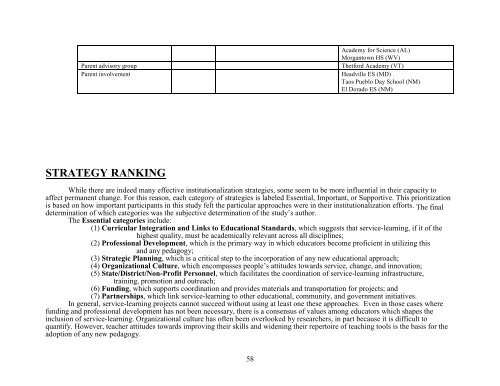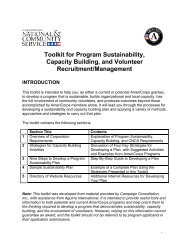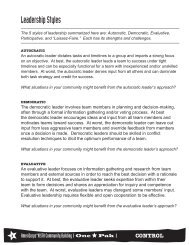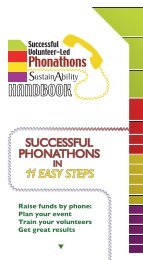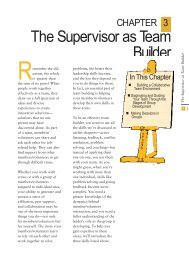MAKE IT LAST FOREVER: THE ... - National Service Resource Center
MAKE IT LAST FOREVER: THE ... - National Service Resource Center
MAKE IT LAST FOREVER: THE ... - National Service Resource Center
You also want an ePaper? Increase the reach of your titles
YUMPU automatically turns print PDFs into web optimized ePapers that Google loves.
Academy for Science (AL)<br />
Morgantown HS (WV)<br />
Parent advisory group Thetford Academy (VT)<br />
Parent involvement Headville ES (MD)<br />
Taos Pueblo Day School (NM)<br />
El Dorado ES (NM)<br />
STRATEGY RANKING<br />
While there are indeed many effective institutionalization strategies, some seem to be more influential in their capacity to<br />
affect permanent change. For this reason, each category of strategies is labeled Essential, Important, or Supportive. This prioritization<br />
is based on how important participants in this study felt the particular approaches were in their institutionalization efforts. The final<br />
determination of which categories was the subjective determination of the study’s author.<br />
The Essential categories include:<br />
(1) Curricular Integration and Links to Educational Standards, which suggests that service-learning, if it of the<br />
highest quality, must be academically relevant across all disciplines;<br />
(2) Professional Development, which is the primary way in which educators become proficient in utilizing this<br />
and any pedagogy;<br />
(3) Strategic Planning, which is a critical step to the incorporation of any new educational approach;<br />
(4) Organizational Culture, which encompasses people’s attitudes towards service, change, and innovation;<br />
(5) State/District/Non-Profit Personnel, which facilitates the coordination of service-learning infrastructure,<br />
training, promotion and outreach;<br />
(6) Funding, which supports coordination and provides materials and transportation for projects; and<br />
(7) Partnerships, which link service-learning to other educational, community, and government initiatives.<br />
In general, service-learning projects cannot succeed without using at least one these approaches. Even in those cases where<br />
funding and professional development has not been necessary, there is a consensus of values among educators which shapes the<br />
inclusion of service-learning. Organizational culture has often been overlooked by researchers, in part because it is difficult to<br />
quantify. However, teacher attitudes towards improving their skills and widening their repertoire of teaching tools is the basis for the<br />
adoption of any new pedagogy.<br />
58


